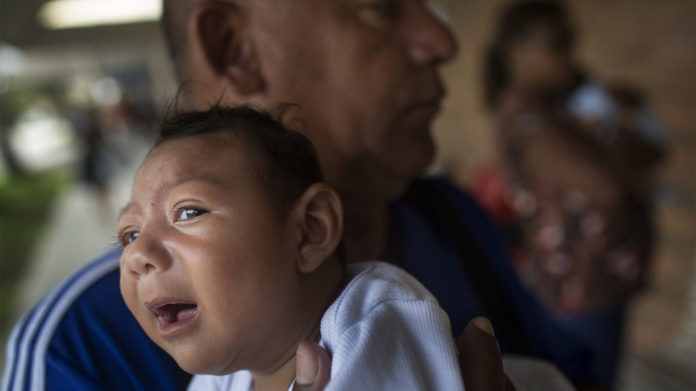Zika virus is spreading ‘explosively’ and may be international health emergency, WHO warns

The World Health Organization (WHO) warned Thursday that the mosquito-borne Zika virus is spreading “explosively” throughout the Americas, and may consitute an international public health emergency. The agency is convening an emergency committee to determine by Feb. 1 whether Zika merits an emergency declaration, as the 2015 Ebola outbreak did.
The Zika virus outbreak has been linked to a surge in the occurrence of a potentially fatal birth defect known as microcephaly, in which babies are born with unusually small heads and incomplete brain development. In addition, the virus has been linked to Guillain-Barre syndrome, which can cause paralysis in previously healthy adults.
The outbreak constitutes a test of the reforms the WHO put in place in the wake of the Ebola outbreak. During that event, which only recently concluded, the cash-strapped international agency was accused of moving far too slowly in responding to urgent please from the ground in impoverished West African nations.
At a meeting on Thursday in Geneva, Margaret Chan, the WHO director-general, told members that the current outbreak of Zika virus is “dramatically different” than any previous outbreak since the virus was first identified in 1947 in the Zika Forest of Uganda.
“For decades, the disease, transmitted by the Aedes genus of mosquito, slumbered, affecting mainly monkeys. In humans, Zika occasionally caused a mild disease of low concern,” she said.
“As of today, cases have been reported in 23 countries and territories in the region,” Chan said. “The level of alarm is extremely high.”
Marcos Espinal, director of communicable diseases and health analysis for the Pan American Health Organization, said Zika is likely to eventually spread to all areas where the mosquito is currently found. He raised the possibility of an eventual 3 to 4 million cases of the disease can be expected. Most of these cases would be so-called “silent” cases, since only about 1 in 5 people in infected with Zika experience symptoms of the illness.
“Arrival of the virus in some places has been associated with a steep increase in the birth of babies with abnormally small heads and in cases of Guillain-Barre syndrome,” she said.
As U.S. health authorities have cautioned, the causal relationship between Zika virus infection and birth defects and neurological disorders has not been firmly established.
On Wednesday, Brazil’s health ministry stated that reported microcephaly cases since October of 2015 have reached 4,180, an increase from the week before, and a tremendous surge compared to previous figures. Before the Zika virus outbreak, microcephaly was extremely rare in Brazil, with only about 150 reported cases per year.
“The possible links, only recently suspected, have rapidly changed the risk profile of Zika, from a mild threat to one of alarming proportions. The increased incidence of microcephaly is particularly alarming, as it places a heart-breaking burden on families and communities,” Chan said.
The Zika virus is spread by a widely distributed species of mosquito known as the Aedes mosquito, which can be found across Central and South America as well as much of the United States. It cannot be spread person-to-person and is not airborne, though much is unknown about whether it can be contracted sexually.

A city worker fumigates insecticide to combat the Aedes Aegypti mosquitoes that transmit the Zika virus, at the San Judas Community in San Salvador, El Salvador, Tuesday, Jan. 26, 2016.
Image: Salvador Melendez/Associated Press
The abundance of mosquitos plus a lack of preexisting immunity in countries like Brazil, Colombia and Venezuela has allowed the virus to spread, and similar conditions in the U.S. have authorities worried.
The U.S. Centers for Disease Control and Prevention (CDC) has said they expect active transmission of the virus within the U.S. to occur in a manner similar to previous outbreaks of dengue and chikungunya viruses. So far, those outbreaks have been relatively small, and mainly in warmer, wetter states. (The same mosquito carries those viruses, too.)
There is not a widespread health infrastructure in place to test for Zika and there currently is no vaccine.
“The level of concern is high, as is the level of uncertainty. Questions abound. We need to get some answers quickly,” Chan said.
So far, countries have reacted to the threat Zika poses through a variety of measures.
The CDC has issued travel advisories recommending that pregnant women in any stage of their pregnancy postpone travel to 24 countries and territories where the virus is actively being spread. This includes popular tourist destinations such as the Dominican Republic, Brazil, the U.S. Virgin Islands and Puerto Rico.
Some countries that are on the CDC list have been focusing their efforts on mosquito eradication programs while warning women to delay pregnancy until more is known about the risks. Such warnings have been issued by governments in El Salvador and the Dominican Republic, among others.
One wild card affecting the virus’ spread has been a record strong El Niño event in the tropical Pacific Ocean. El Niño events influence weather patterns around the world, and can increase rainfall in parts of South America, thereby creating more ideal breeding grounds for Zika-spreading mosquitos.
“Severe drought, flooding, heavy rains and temperature rises are all known effects of El Niño — a warming of the central to eastern tropical Pacific Ocean. An increase in mosquitos can be expected due to expanding and favorable breeding sites,” a WHO fact sheet states. Severe flooding occurred in December and January in Paraguay, Uruguay, Argentina, and southern Brazil.
Related twitter hashtags: #ZikaVirus , #Zika
HealthPages.wiki related pages: http://healthpages.wiki/wiki/Zika_fever
